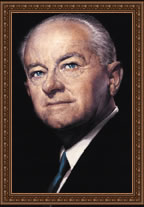Ernest Holmes
 Ernest Holmes (1887-1960), was born on a small farm in Maine, ( USA ). He left school at the age of 15 but as he had a brilliant mind and a love for humanity, he never stopped learning. His thirst for knowledge and Truth led him to study the works of many philosophers and ‘truth seekers’, such as Ralph Waldo Emerson, Phineas Quimby, Emma Curtis Hopkins and Judge Thomas Troward, as well as the Bible and sacred texts of many world religions. He is the founder of Religious Science and the author of many books including his masterpiece The Science of Mind (1926) which he said correlated "the laws of science, opinions of philosophy, and revelations of religion applied human needs and the aspirations of man."
Ernest Holmes (1887-1960), was born on a small farm in Maine, ( USA ). He left school at the age of 15 but as he had a brilliant mind and a love for humanity, he never stopped learning. His thirst for knowledge and Truth led him to study the works of many philosophers and ‘truth seekers’, such as Ralph Waldo Emerson, Phineas Quimby, Emma Curtis Hopkins and Judge Thomas Troward, as well as the Bible and sacred texts of many world religions. He is the founder of Religious Science and the author of many books including his masterpiece The Science of Mind (1926) which he said correlated "the laws of science, opinions of philosophy, and revelations of religion applied human needs and the aspirations of man."
Ernest Holmes teaching is based on a belief that God as "Universal Mind, Spirit, Intelligence, is the origin of everything”, and that there is a universal law of cause and effect operating in the life of humankind. He called his philosophy a science because "it can be taught, it can be learned and it can be consciously applied with a certainty of definite and repeatable results.
Amongst his many accomplishments; Ernest Holmes was an inspiring public speaker on metaphysics; he also hosted popular programs on both radio and television called "This Thing Called Life". He would begin each broadcast with this statement: "There is a power for good in the Universe, greater than you are, and you can use it." This was the essence of his belief. He launched the ‘Science of Mind Magazine’, a monthly publication that has brought spiritual teachings to the world ever since. His organisation eventually evolved into the Church of Religious Science in 1953 and the United Church of Religious Science (UCRS) in 1967, now called United Centers for Spiritual Living (UCSL).
Ernest Holmes legacy lives on; his teachings and writings have impacted millions of people as they travel their spiritual paths.


